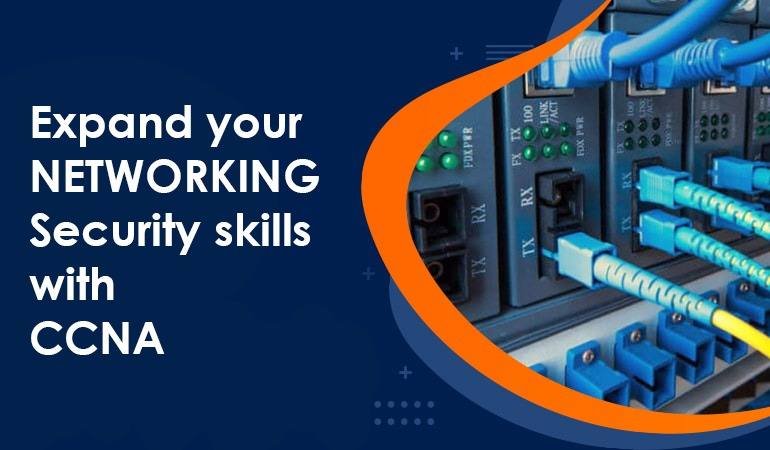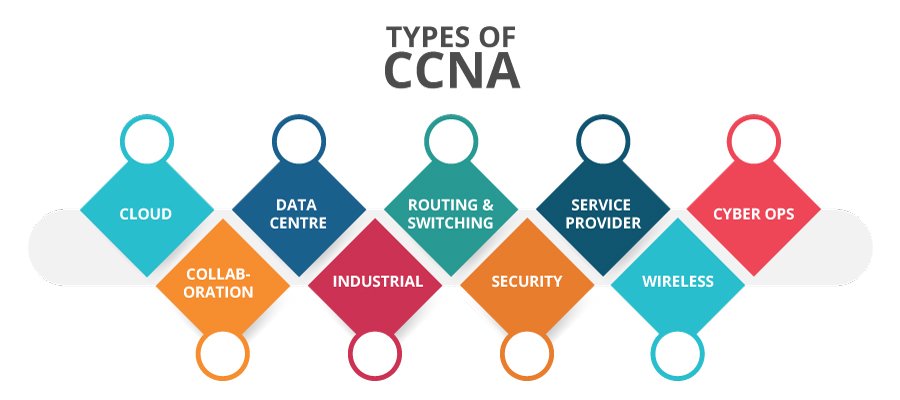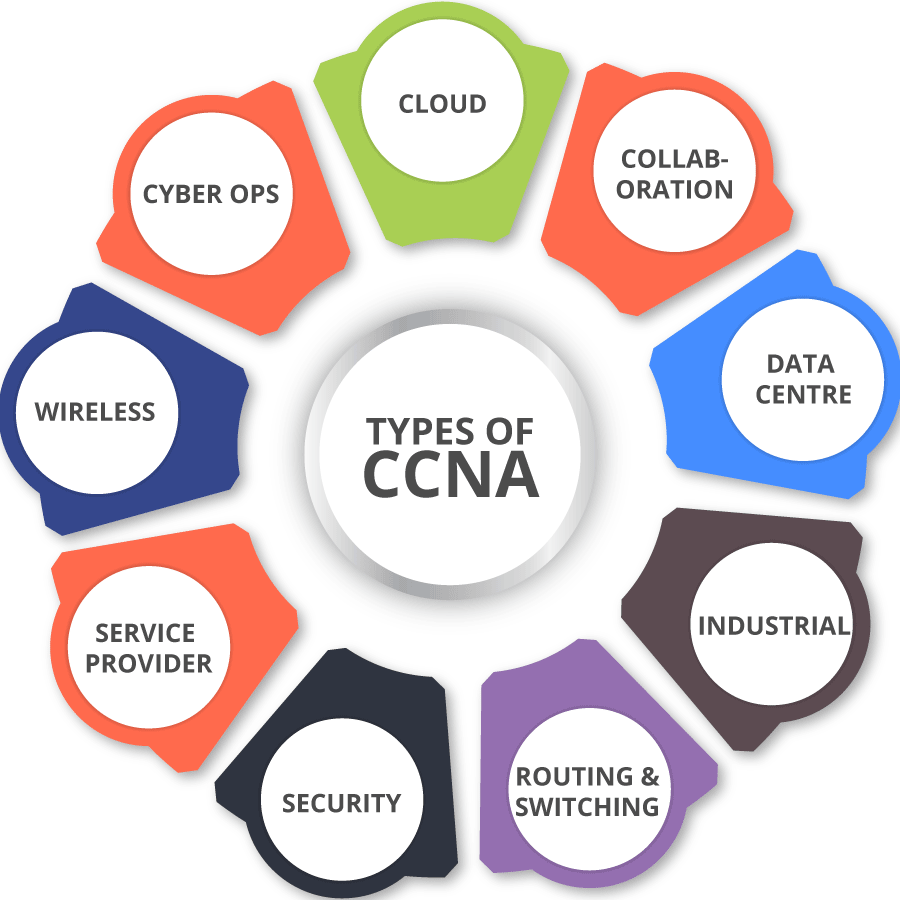

CCNA (Cisco Certified Network Associate) is a famous certification for laptop community engineers furnished via way of means of the business enterprise named Cisco Systems. ... It allows to turn out to be acquainted with vast variety of networking principles like OSI models, IP addressing, Network security, etc.
CCNA is a famous certification for pc community engineers furnished with the aid of using the enterprise named Cisco Systems. ... It enables to turn out to be acquainted with huge variety of networking standards like OSI models, IP addressing, Network security, etc.
CCNA certification validates your skills and knowledge in network fundamentals, network access, IP connectivity, IP services, security fundamentals, and automation and programmability.
Introduction:
The CCNA certification title has become the leading entry level certification in computer networking field available today. The CCNA (Cisco Certified Network Associate) certification was developed by Cisco to test a candidate's knowledge of networking at entry level. The CCNA certification analyzes the candidate's ability to install, configure, operate, and troubleshoot medium-size routed and switched networks.
The CCNA (Cisco Certified Network Associate) certification is recognized by IT employers when considering a fresher's profile for a vacancy or for a salary hike/promotion for experienced employees. The CCNA (Cisco Certified Network Associate) exam covers a broad range of networking concepts to prepare candidates for the technologies they are likely to work with in today’s network environments.
Reasons why you should get a CCNA certification
What Kind of Topics are part of the CCNA Certification?

While the program has been around for a few years now, the company Cisco which is behind this certification program continues to evolve and modify the subjects so that they better suit changing industry trends.
A major overhaul was done in the year 2013 when they established multiple job specific exams allowing professionals to specialize in a specific area. A total of 9 different CCNA topics are now available and you can choose the right area of expertise based on your future goals.
CCNA Cloud – The subject strongly focuses on cloud technologies, storage and Cisco cloud solutions. With cloud technology becoming prevalent, this is considered a valuable stream by many test takers.
CCNA Collaboration – Professionals working in the IP telephony, networking fields can opt for Collaboration which is a comprehensive course covering various technologies related to voice, data, video and mobile apps.
CCNA Cyber Ops – The certification when completed denotes a professional who is a cyber-security expert capable of managing digital security of an organization.
CCNA Data Center – Topics covered in this particular test includes establishing a data center, designing the network, data management, maintaining equipment and hardware.
CCNA Industrial – The certification allows an individual to understand the networking and operations required to successfully run industrial establishments including oil, gas, electric and manufacturing sectors.
CCNA Routing & Switching – The core subject that Cisco focuses on – it’s a must-have credential for all network engineers and is a basic test any network professional can take up.
CCNA Security – The individual who completes this CCNA Security program is certified to have knowledge in securing data, monitoring its availability, sharing and can help build a secure digital infrastructure for any type of industry.
CCNA Service Provider – The course is completed by individuals who work for hire as network engineers to help organizations as a service. In order to complete the course, they require exceptional skills and a strong hand in current trends in networking.
CCNA Wireless – All wireless networking technology related skills are certified when a professional completes this test successfully. They are responsible for configuring, monitoring signal strength and setting up secure wireless infrastructure.
Cisco CCNA Certification exam domains

1. Networking Fundamentals: Networking Fundamentals is the first domain of the CCNA certification exam. It carries a weight of 20% in the exam. The following subdomains are included in it:
· Explain the importance and uses of networking devices like routers, switches, hubs, etc.
· Types of network topologies used and types of cabling
· TCP and UDP protocols
· IPV4 and IPV6
· Wireless principles
2. Network Access: The Network Access domain also carries the weightage of 20% in the exam. The domain includes the following subtopics:
· VLANs (Virtual Local Area Network)
· Inters witch connectivity
· Cisco Discovery Protocol and LLDP (Link Layer Discovery Protocol)
· Wireless architectures, RSTP (Rapid Spanning Tree Protocol), and WLAN (Wireless Local Area Network) Components
3. IP Connectivity: The IP Service domain carries a weightage of 25% in the exam. The domains include the following subtopics:
· Routing protocol code- you will get familiar with the codes for connected routes, static routes, local routes, and OSPF routes
· Interpreting components of the routing table
· Knowing how a router makes a forwarding decision by default, and FHRP (First Hop Redundancy Protocol)
4. IP Services: The IP service domain carries a weightage of 10% in the exam. It makes us aware of NAT’s configuration & verification (Network Address Translation) static and pool and NTP (Network Time Protocol) operating in client and server mode. This module also covers:
· DHCP (Dynamic Host Control Protocol)
· DNS (Domain Name System)
· SMTP (Simple Mail Transfer Protocol)
· The functions of FTP in a network
5. Security Fundamentals: As we all know, security is an essential aspect of the networking domain. Therefore, this module is added to the CCNA Certification exam. The Security Fundamentals module carries a 15% exam weightage. It takes you from the basics of security and types of attacks to create a more secure network. From the beginning of this module, you will understand threats, vulnerabilities, attacks, and mitigation techniques. You will learn how to apply them to protect the network infrastructure. This module also teaches about:
· Layer 2 security like DHCP snooping
· Dynamic ARP inspection
· Port security
· Wireless security protocols like WPA, WPA2, WPA3
6. Automation and Programmability: This module offers a perception of how automation leaves an effect on community management. The Automation and Programmability area incorporates the examination weightage of 10%. This segment is quite light, however, it opens up new subjects that have been unknown to community engineers. As the community turns large and complex, it's miles required to realize which site visitors are passing via our community. The automation and programmability will assist us in doing that.
Prerequisites for CCNA (200-301)
The CCNA exam requires no formal prerequisites, but it is recommended to have a basic understanding of the IP addressing and networking fundamentals. Having one year of experience in implementing and managing Cisco solutions is a plus.
Certifications After CCNA – Specialize or Diversify?
The next step after completing the CCNA is for you to decide.
Do you want to specialize in a particular area of networking? Or, do you wish to diversify and generalize your knowledge?
This is a tough question and is the subject of many debates in the IT world. For you to answer this, have a think about what your passion is, and what your interests are.
If you decide you’re interested or excited about a particular area of networking, such as network engineering, then you could move towards certifications in that area. If you’re not sure about specialization, that’s OK, there are other options as well.
Which Certifications Can I Specialize In?
Cisco offers many certifications for those who have completed the CCNA. There are nine different specializations currently offered by Cisco. Some of them have more related certifications than others. They are:
Routing and Switching – This is a popular specialization in the industry, as it’s relevant to many companies and it can be used on all infrastructures.
Design – Related to the design and layout of networks and network components.
Network Security – A constantly changing field, and is useful for those looking to work in government departments.
Wireless – A specialization in wireless networking technologies and how they relate to organizations.
Voice – Similar to the routing and switching specialization, but it has more interaction with employees as it’s focused on telephone technologies.
Service Provider & Service Provider Operations – Both of these are new and quite similar, and they are related to the specific skills and operations of service provider organizations.
Data Centre – Networking, storage and servers and how they are used and optimized in a data center.
Storage Networking – Involves working with storage solutions and large-scale networks.
Most certifications have a progression – from CCNA to CCNP to CCIE. The two exceptions are Data Centre and Storage Networking.
This means you can choose one of these specializations and have a defined certification path set out for you.
For example, if you’re interested in Voice, after the CCNA you can choose to specialist in Voice by obtaining the CCNA Voice, and then the CCNP Voice, and possibly even the CCIE Voice. This will give you a very good understanding and level of knowledge on Cisco Voice technologies! This plan can be applied to most of the certification specialties mentioned above.
If you’re not sure what you want to specialize in after CCNA, you can look to the CCNP certification. It’s a step up from the CCNA and isn’t in one of the specialization paths as yet – so you can obtain that and see how you feel afterwards.
What About CompTIA Certifications?

Other options available to you after CCNA are certifications from CompTIA. Some of these options are
Network+ – The Network+ is also a lower-level networking certification. However, it’s recommended that you get this before the CCNA. If you don’t have it already, you might find it a bit repetitive to the CCNA, but it does include some vendor-neutral areas.
Security+ – This certification is great for those who wish to move into the security field. Pairing this with the CCNA Security is a great way to start out a career in the IT security field.
Server+ – If you’re looking to move into server administration or support, this could be a certification to get. There may be some overlap with the CCNA but there would also be some vendor-neutral areas as well.
Conclusion
It will not be wrong to say that the CCNA exam is one of the hardest exams in the IT industry. This certification helps networking professionals to demonstrate and validate their skills. It serves as a massive opportunity for IT experts to develop in their careers. With this certification, you become a specialist in networking with global recognition.
If you are an aimed networking professional preparing for CCNA certification, this CCNA Certificate exam preparation guide will help you a lot to complete the goal.
Thank you for Taking time to read this Blog.
Copyright Bitonlinelearn © 2021. All Rights Reserved | Design and Developed By BITINFOTECH